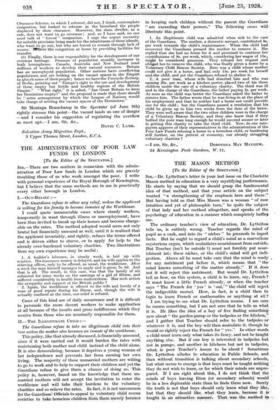THE ADMINISTRATION OF POOR LAW - FUNDS IN LONDON [To the
Editor of the SPECTATOR.] Sm,—There are two matters in connexion with the admin- istration of Poor Law funds in London which are gravely troubling those of us who work amongst the poor. I write with personal experience of the Royal Borough of Kensington, but I believe that the same methods are in use in practically every other borough in London.
I.—OUT-RELIEF :— The Guardians refuse to allow any relief, unless the applicant is willing for his family to become inmates of the Workhouse.
I could quote innumerable cases where steady workers, temporarily in want through illness or unemployment, have been thus invited to break up their homes and become charge- able on the rates. The method adopted would seem not only brutal but financially unsound as well, until it is realized that the applicant invariably, and rightly, refuses the terms offered and is driven either to starve, or to apply for help to the already over-burdened voluntary charities. Two illustrations from my own experience may be useful : 1. A builder's labourer, in steady work, is laid up with sciatica. His insurance money is delayed, and his wife applies to the relieving officer, only to be offered, as usual, the workhouse. After a week the man himself manages to apply and is given 7s. 6d. And that is all. The result, in this case, was that the family of six subsisted for some weeks on the earnings of a girl of fifteen, and suffered considerably in health from malnutrition. Has such action the sympathy and support of the British public ? - 2. Again, the ivorkhouse is offered to the wife and family of a man • of good repute during his illness, and, though the wife is actually confined at the time,'out-relief is refused. - - Cases of this kind are of daily occurrence and it is difficult to persuade the more decent workers to make application at all because of the insults and grois indifference which they receive from those who are nominally responsible for them.
II.—TAE ILLEGITIMATE CHILD The Guardians--refuse to take an illegitimate child into their care unless the mother also becomes an inmate of the workhouse.
This policy, like that already discussed, is financially unsound, since if it were carried out it would burden the rates with maintaining both mother and child instead of the child alone. It is also demoralizing, because it deprives a young woman of her independence and prevents her from earning her own living. The majority of these unmarried mothers are willing to go to work and to help to support their children and yet the Guardians refuse to give them a chance of doing so. This policy is, however, based on the knowledge that these unr married mothers -will- not accept the invitation to enter the workhouse and will take their burdens to the voluntary charities and so relieve the rates. In, fact, it is not uncommon for the Guardians! Officials to appeal to voluntary child rescue societies to take homeleas children from them merely heiaine in keeping such children without the parent -the - Guardians " are exceeding their powers." The following cases will illustrate this point.
1. An illegitimate child was admitted when sick to the care of the Guardians. The mother, a domestic servant, contributed 8s.. per week towards the child's maintenance.. When the child had recovered the Guardians pressed' the mother to remove it. She replied- that she had no home for it and promised to continue her contributions of 8s. per-week, which, conssiering her wages of 15s., might be considered generous. They refused her request and obliged her-to remove the child; who was finally given a home by a Voluntary Child Rescue Society. Here was a child whose mother could not• give it a home, and had only 15s. per week for herself and the child, and yet the Guardians refused to, shelter it. 2, A. poor man, ivhoge wife 'had deserted him and who was earning 20s; per week as a kitchen porter, placed two of his three children under the care of a voluntary charity. The third was ill and in the charge of the Gritardians, the father paying 2s. per week. As soon as the child was betti3r the 'Guardians asked the father to remove him. The father wrote that he was living-in at the place of his employment and that he neither had a home nor could provide one for the child ; but the Guardians passed a resolution that his child be given 'up to him two weeks from the date of the letter. They were well aware that the two other children were in the charge of a Voluntary Rescue Society, and they also knew that if they bullied the poor man long enough.he would succeed sooner or later in getting this charity to take the third child. Now, do our rate- payers approve of their representativeS in the administration of the Poor Law Funds refusing a home to a homeless child, or burdening still further on the pretext of economy, our already. struggling .
voluntary charities ? _
34 Kensington Park Gardens, W.11.






























 Previous page
Previous page